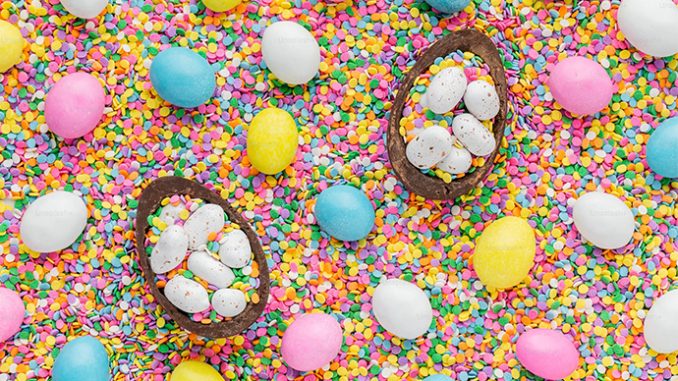
Maryam Sicard / Unsplash.com)
Starbucks faced consumer pushback a few years back when, in the name of “inclusivity,” it started featuring red and green coffee cups in December while scrupulously omitting the word “Christmas.” Sometimes the cups added “Happy Holidays,” but often they were just generic expressions of the dread Christmas color binary.
The same thing is happening with Easter.
Go to your local supermarket or other store and take a look at the “Easter” assortment. How many times do you see the word “Easter” on the packaging? How often is it missing completely?
I bet you will see a clear “outcomes-based disparity.”
Regardless, the motivations in both cases are the same: to profit from Christian-origin holidays without mentioning Christianity. The goal is to make money with enough allusions to those holidays without actually invoking their dread names.
After all, why do Starbucks red-and-green coffee cups disappear in January? And why will the generic “eggs” you’re being sold this week be marked down 50% on April 21? If they’re not “Easter eggs,” wouldn’t they be just as chocolaty delicious on, say, September 21? And if the Paas “egg decorating kit” isn’t an Easter thing, why aren’t you able to find it on the shelf in June? Given the price of eggs, it seems some people might want to celebrate them with a touch of color all year long.
The truth is that these are “Easter” eggs, “Easter” egg decoration kits, and “Easter” candies (as well as “Easter rabbits,” since you won’t find them around on All Saints Day). Their manufacturers are happy to get Christians’ money, but without mentioning the Christians’ holidays. To ensure “inclusivity,” however, Cadbury is explicitly marketing non-Easter “Rainbow Eggs”. Last time I checked, Noah didn’t mention any eggs—although he had a better chance with a dove than with a mammal rabbit (cf Gen 8:8-12).
Nor is this an equal discrimination phenomenon. We just finished Ramadan, which, in a certain sense, doesn’t seem celebratory. Before we saw a passel of politicians and pastors falling over themselves to wish a “Happy Ramadan!” did anyone think of saying, “Happy Lent?” or “Have a great Good Friday?” But we saw the media, public officials, and even cardinals proclaiming Ramadan wishes not just once but repeatedly, while even kings were packing dates for evening eats.
Nor do stores hide their “Passover” selections. Granted, the market is smaller and delicacies like dry matzoh crackers and horseradish are acquired tastes, but nobody renames their offerings for our Jewish brethren (even if they give them less prominence so as not to offend the boycott-and-divestment anti-Semites). If producers did not hide the Jewish identity of their Passover-centric products for a smaller market, why are they hiding the “Easter” identity of products being sold for a bigger market on its central feast day?
Decades ago, the term “war on Christmas” was coined as shorthand for the woke effort to co-opt Noel while avoiding its name. “Christmas” became the holiday that dare not speak its name.
As I’ve noted often, over the years, Easter is an even more endangered Christian holiday because of its increasing “invisibility.” What do I mean?
Christmas, fixed on December 25, is hard to ignore. It is too set into Western culture to be avoided. It is too big a consumer spree to be ignored. But it is also too Christian to be acknowledged. So, it turns into “winter holiday” and a “happy holiday,” but its external trappings–lights, “holiday” trees, and even creche scenes–are somehow co-opted by the larger, “disestablished” culture.
Easter doesn’t have that same footprint. Its moveability means that, at best, it acquires a calendrical “target range” rather than a niche. Good Friday, once observed as a holiday in many states, has increasingly become just another workday. (Consider how many parishes have moved the Liturgy of the Lord’s Passion from its traditional 3 pm slot until later in the evening to accommodate that fact). Easter, always a Sunday, can be ignored: wish somebody a “nice weekend” on Good Friday and see them on Monday, just like the other 51 weekends of the year.
And the Easter “market” is a shadow of its Christmas counterpart: nobody incurs massive credit card debt over plastic bunnies, candy eggs, and some straw. Easter “bonnets” long ago disappeared with the general “slumming down” of even “holiday” couture. How many people still buy their kids new outfits for Easter?
No, Easter can safely be ignored. Which is why its omission from even the few trinkets that afford public cultural visibility to its presence–“eggs” and their coloring dyes and kids’ “rabbits”—should be even more offensive. It’s an attempt to erase an already anemic public presence.
It wouldn’t be a bad thing to write to people who want our money–Cadbury, Paas, Lindt, and Hershey’s–and ask why they are ashamed of calling their products “Easter” eggs. Or perhaps it is an entrepreneurial opportunity for Christians to take back the market for their products.
Easter is the central solemnity of the Christian faith. Without it, as St. Paul remarks (1 Cor 15:2), Christians might as well pack it up. Yet, in a nation still ostensibly majority Christian, Easter’s public visibility is pale, its resonance in the larger culture fading.
I’m not identifying Easter with trinkets like Easter candy or rabbits, but I’m also not willing to dissociate them. Easter eggs, after all, have Christian origins, reminding us of Christ breaking out of the tomb and of their return to the table after traditionally having been among Lent’s forbidden foods.
At least we still have an “Easter Egg Roll” at the White House. How long before that becomes a generic “egg roll” with the opposition party turning it into talking points on the price of a dozen?
If you value the news and views Catholic World Report provides, please consider donating to support our efforts. Your contribution will help us continue to make CWR available to all readers worldwide for free, without a subscription. Thank you for your generosity!
Click here for more information on donating to CWR. Click here to sign up for our newsletter.







